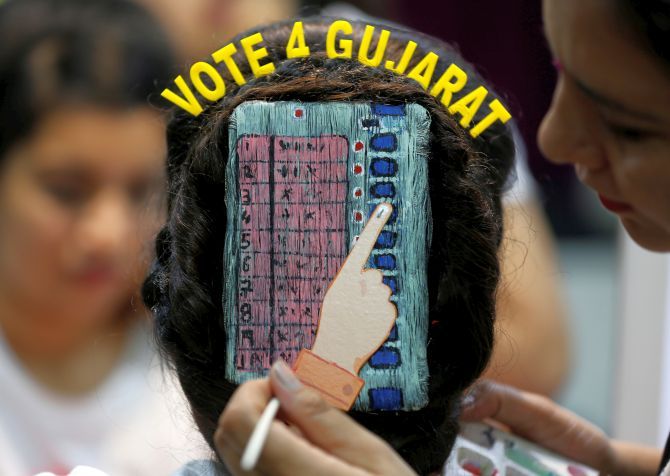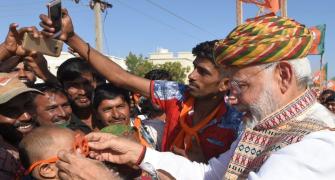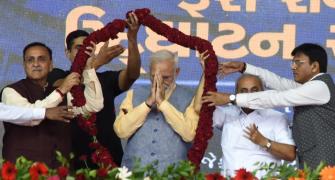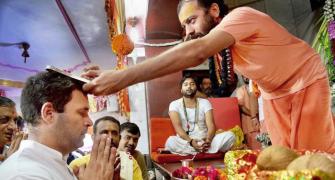If the BJP falls sizeably short of the 115 mark -- the seats it won in 2012 -- it will be hard to deny the party hasn't suffered a telling reverse, notes Karan Thapar.

On Monday, December 18, we will know the result of the Gujarat elections. However, as the campaign approaches its climax there is speculation the electoral mood of the state has altered.
Depending on who you talk to, the outcome is said to be reasonably close, a cliff-hanger, or a clear victory for one side.
But are we analysing the alleged winds of change accurately?
Or are these predictions just a reflection of wishful thinking?
The first problem is you can make a convincing case for almost any outcome. The second is we don't have reliable -- leave aside indisputable -- evidence to judge by.
Questionable polls, electoral logic, individual perception and reporter impressions, all spiced up with anecdote and quotation, lie at the foundation of these judgements.
But how reliable is all of this? Let's examine the two key outcomes more closely to find out.
First, there are several reasons to believe the Bharatiya Janata Party is on the back foot.
After 22 unbroken years in power, it's natural for voters to want a change.
Already sizeable sections of the Gujarati population, like the Patidars, Other Backward Classes and Dalits, are said to feel deceived and angry.
Many want to teach the ruling party a lesson.
On top of this comes the suffering caused by demonetisation and the goods and services tax. Even if time has dimmed the memory of the former and recent amendments tempered the pain of the latter, newspaper reports suggest both could cost the BJP votes.
And, finally, there's farmer distress which could hurt the party in Saurashtra.
The fact Modi had up to 30 rallies and public meetings in the last two weeks is surely a sign he senses the challenge. That a sizeable proportion of his Cabinet is also campaigning can, presumably, be taken as confirmation.
And the defensive nature of the party's rhetoric seems to reflect concern rather than confidence.
Now, let's flip the coin and look at the other side. Modi remains enormously popular and has the capacity to single-handedly alter the direction of the political weather vane.
Helping him to achieve victory is Gujarat's lingering distrust of the Congress.
Neither the Patidars nor the OBCs are irretrievably annoyed by the BJP or fully committed to the Congress.
The truth is that we just don't know how the majority voted on the 9th and will vote on the 14th.
So far the polls, for what they are worth, suggest the BJP is as strong as it was five years ago. Both in terms of seats and vote share, they are predicting a comparable result.
For the Congress to win they would have to be terribly wrong. But that has happened before.
Two developments could make a difference.
Modi's strenuous campaigning could convince voters the BJP senses trouble and embolden fence-sitters to vote against it.
Sometimes when politicians try too hard they, paradoxically, strengthen the case against them. The poor attendance at his initial rallies, if it persists or grows, could be suggestive.
The other critical development is the impact Rahul Gandhi is making on the Gujarati people.
Previously they didn't take him seriously, but now, as they half turn their backs on the BJP, have they started to view him differently?
His speeches certainly reflect their concerns but if he also carries credibility, he might influence the voters. As yet, we don't know.
If the contest is as close as some newspaper accounts suggest -- but don't forget the polls strongly disagree -- I don't see the BJP winning the 150 seats Amit Shah has set his sights upon. And let's be honest, he seems to have stopped making that boast.
However, can the BJP win 115, as it did in 2012? If it does or comes close, honour will have been saved.
But if the BJP falls sizeably short -- and remember it can lose 23 seats before it loses its majority -- it will be hard to deny the party hasn't suffered a telling reverse.
All of which means we have an interesting situation on our hands.
Victory could still feel like defeat for the BJP whilst a loss could cheer up the Congress, almost as if it was a win!










